Bridged CO
This chapter provides information about bridged CO model of Triple Play Service Delivery Architecture (TPSDA).
Topics in this chapter include:
Applicability
The information and configuration in this chapter are based on SR OS Release 7.0.R4. This chapter is related only to the use of IPv4 DHCP hosts.
Knowledge of the Triple Play Service Delivery Architecture (TPSDA) concepts is assumed throughout this chapter.
Overview
This chapter provides information about basic technology, network topology and configuration examples which are used in Bridged CO model of Triple Play Service Delivery Architecture (TPSDA). Regardless of aggregation technologies which are used by customers, Nokia offers flexible and easy to use methodology to manage DHCP subscribers in Layer 2 domain and distribute subscriber management intelligence across multiple nodes.
Bridged CO is a basic TPSDA model and implies that access nodes are united in one Layer 2 aggregation network and VPLS is used as a primary technology for these purposes. This fact allows the use of subscriber management functionality on BSA nodes. Bridged CO network topology is shown in Bridged CO Network Topology.

Following types of nodes are defined in Bridged CO model:
Broadband Service Access Node (BSAN) — Access node connected to Layer 2 domain to aggregate all traffic from subscribers (IP DSLAM, ethernet switch).
Broadband Services Aggregator (BSA) — Layer 2 node, which is capable for subscriber management in VPLS service (7450 ESS).
Broadband Service Router (BSR) — Layer 3 node, which is capable for routing and service allocation (7750 SR).
As any model, Bridged CO introduces several key concepts that must be determined in advance. Major ones are presented in Key Concepts of Bridged CO Model and include:
Subscriber— A set of hosts belonging to a single connection line (switch port, DSL line)
Subscriber host — Unique customer device (could be PC, IP phone, STB, routed CPE).
Subscriber-profile — Configured entity which defines the aggregate QoS for all hosts within a subscriber context.
SLA-profile — Configured entity which defines QoS policies and filters for a subset of hosts within a subscriber context.
Subscriber identification policy — Configured entity which defines the python script for dynamic subscriber host identification
Authentication policy — Configured entity which defines the RADIUS servers to use for dynamic subscriber host identification
Subscriber identification string — 32 characters identification string which uniquely identifies a subscriber on a node.
Figure 2. Key Concepts of Bridged CO Model 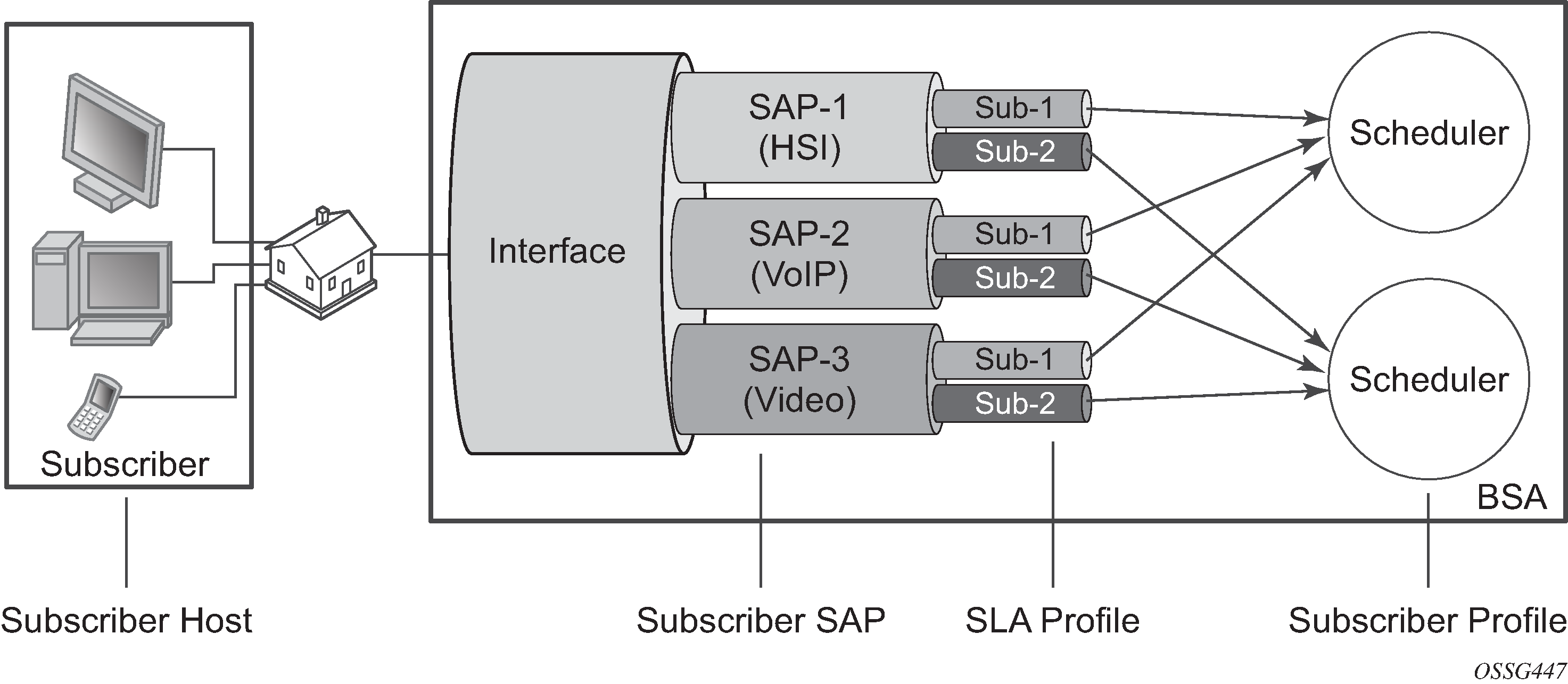
For normal operation each subscriber has to get several parameters / attributes:
Subscriber-ID — Attribute, which uniquely identifies subscriber on the node and used as index key in subscriber database
IP parameters — Attributes, which allows host to get access to services
Subscriber profile and SLA profile for subscriber host — a set of filters and QoS policies.
Lease time — Period when subscriber parameters are kept in subscriber database on the node.
There are several methods how to get each of these parameters:
Static
Python scripts
RADIUS
DHCP
Each of the subscriber parameters could be defined in several ways simultaneously. In this case use the following algorithm for selecting:
For subscriber profile
A lookup in the subscriber-explicit-map is performed with the sub-ident string returned by the Python script, RADIUS or statically configured. If a matching entry is found, the sub-profile-name (if defined) is taken. If no entry was found go to 1.b.
A:BSA>config>subscr-mgmt# info explicit-subscriber-map entry key "Sub-1" sub-profile "sub-profile-1" sla-profile "sla-profile-1"If a sub-ident-policy is defined on the SAP, a lookup is done on its sub-profile-map with the sub-profile string from the script. The sub-profile-name is taken from the entry. If no entry was found go to 1.c.
A:BSA>config>service>vpls>sap# info sub-sla-mgmt sub-ident-policy "sub-ident-policy-1" A:BSA>config>subscr-mgmt# info sub-ident-policy "sub-ident-policy-1" create sub-profile-map entry key "sub-1" sub-profile "sub-profile-1"If provisioned, the sub-profile-name is taken from the def-sub-profile attribute on the SAP. If no entry was found go to 1.d.
A:BSA>config>service>vpls>sap# info sub-sla-mgmt def-sub-profile "sub-profile-1"If a sub-profile with the name default is provisioned. If no entry was found DHCP Ack is dropped.
A:BSA>config>subscr-mgmt# info sub-profile "default" createFigure 3. Flow Chart for Subscriber-Profile Identification Algorithm 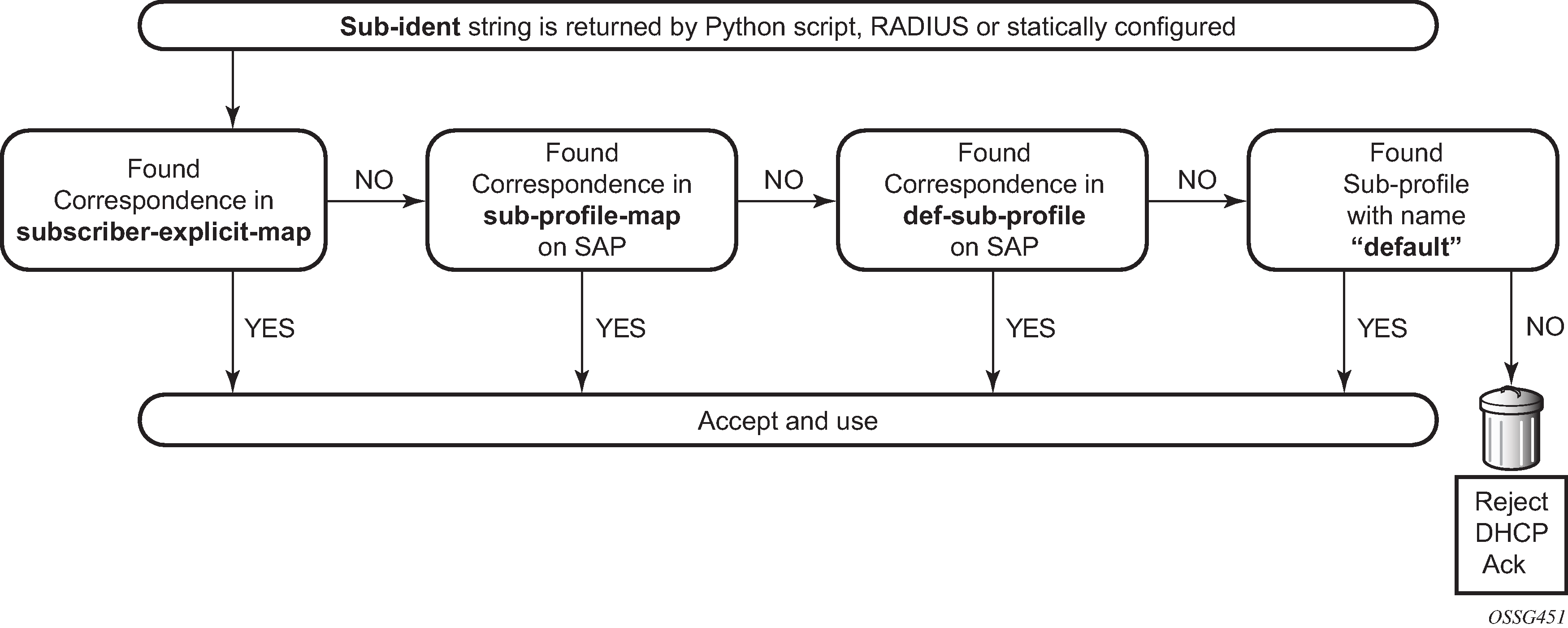
For SLA profile
The sla-profile-name is taken from the sub-ident string (returned by the Python script, RADIUS or statically configured) in the subscriber-explicit-map. If no entry was found go to 2.b2.a.
A:BSA>config>subscr-mgmt# info explicit-subscriber-map entry key "Sub-1" sub-profile "sub-profile-1" sla-profile "sla-profile-1"A lookup with the sla-profile string from the script is done in the sla-profile-map of the sub-profile found earlier. The corresponding sla-profile-name is used. If no entry was found go to 2.c:
A:BSA>config>subscr-mgmt# info sub-profile "sub-profile-1" create sla-profile-map entry key "sla-1" sla-profile "sla-profile-1"The sla-profile-name is taken from sla-profile-map of the sub-ident-policy configured on the SAP. The corresponding sla-profile-name is used. If no entry was found go to 2.d.
A:BSA>config>service>vpls>sap# info sub-sla-mgmt sub-ident-policy "sub-ident-policy-1" A:BSA>config>subscr-mgmt# info sub-ident-policy "sub-ident-policy-1" create sla-profile-map entry key "sla-1" sla-profile "sla-profile-1"The sla-profile-name is taken from the def-sla-profile attribute on the SAP. If no entry was found DHCP Ack is dropped.
A:BSA>config>service>vpls>sap# info sub-sla-mgmt def-sla-profile "sla-profile-1"Figure 4. Flowchart for SLA-Profile Identification Algorithm 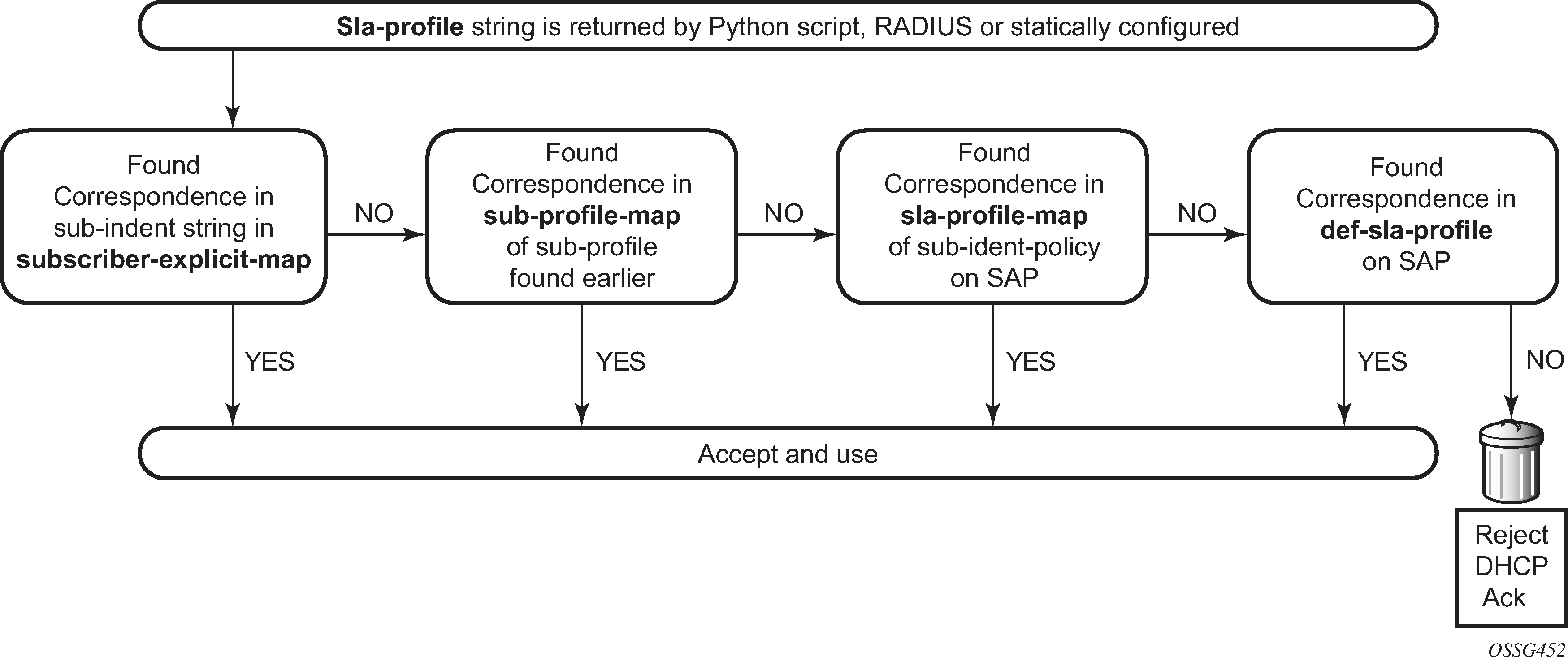
Static configuration has priority over RADIUS configuration and RADIUS has priority over DHCP/Python scripts.
Each host can have different SLA-profile, while sub-profile applies to whole subscriber. The last definition of sub-profile will force all previously defined hosts to change their sub-profile.
Bridged CO supports typical access node connection models, such as:
One VLAN per service (ESM for subscriber differentiation and SAP for service)
One VLAN per subscriber (SAP for subscriber differentiation and QoS flag for service)
One VLAN per access node (ESM for subscriber differentiation and QoS flag for service)
Each of these modes has its pros and cons, but this is out of scope of this document.
This configuration guide focuses on configuration of one subscriber with three different hosts. VLAN per service is used as mode of subscriber aggregation and mixed RADIUS and DHCP as subscriber identification method. IP termination is done in IES service of BSR.
Correlation of BSA/BSR services and subscriber hosts is presented in Correlation of Hosts and BSA/BSR Services .
BSA (Service/Features) |
BSR (Service/Features) |
|
|---|---|---|
Host-1 ca:00:0c:54:00:08 |
VPLS-100
|
IES-100 |
Host-2 ca:01:08:10:00:08 |
VPLS-200
|
IES-200
|
Host-3 ca:02:02:d0:00:08 |
VPLS-300
|
IES-300
|
Different methods of authentication and address allocation were chosen for demonstration purposes. The customer is not limited to one method and can use a combination of methods as presented in this guide.
The following entities should be configured in advance. Refer to the appropriate platform user guide for specific information.
Basic router configuration (interfaces, routing protocols, MPLS)
External RADIUS server
External/Local DHCP server
Configuration
A sample topology is presented in Sample Topology.
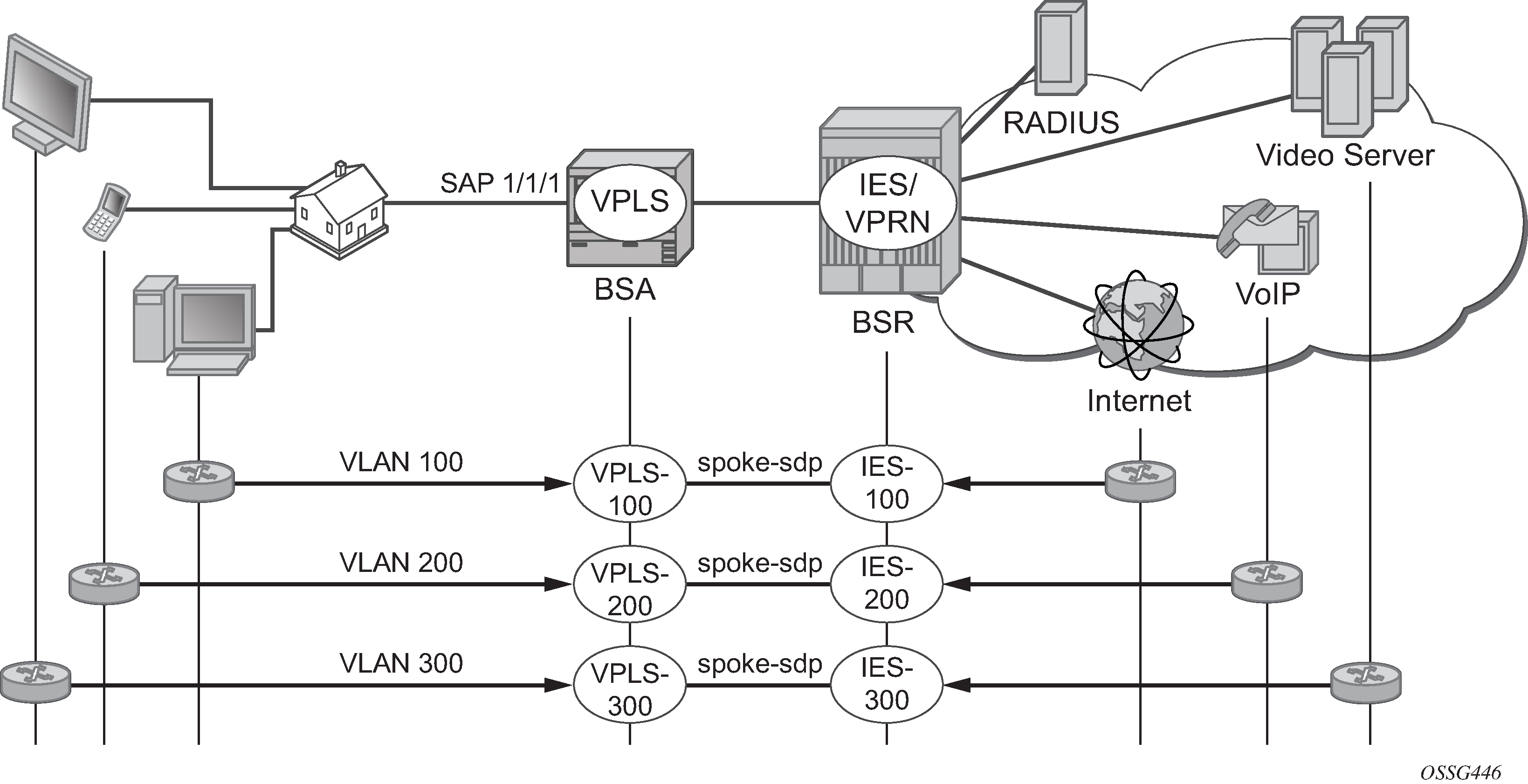
Bridged CO model requires certain techniques and features to be used on different nodes. Major methods are presented in Functionality of Each Node.

The following configuration steps are required:
On BSA
Configure subscriber management profiles
Configure sla profiles
Configure subscriber profiles
Configure subscriber identification policies
Configure authentication and accounting policies if required
Configure VPLS service
Configure split horizon group
Configure SAP
2.1 Configure anti-spoofing filters
2.2 Configure DHCP snooping
2.3 Configure optional parameters (lease split, L2 DHCP relay agent, etc.)
2.4 In case of RADIUS authentication apply authentication policy
2.5 Configure ESM
Configure SDP
3.1 Configure DHCP snooping
On BSR
Configure IES service
Configure IP interface
1.1 Configure DHCP relay agent if required
Basic ESM Configuration on BSA
Subscriber management is enabled on BSA in Bridged CO model. A relevant configuration is presented below. SLA and subscriber profiles show the default configurations. The authentication policy appeals to RADIUS server 192.0.2.5. The subscriber identification policy is configured to use DHCP Option 254 to transfer custom attributes (subscriber-id, sla-profile, sub-profile, etc.)
A:BSA>config>subscr-mgmt# info
authentication-policy "auth-policy-1" create
password password-1
radius-authentication-server
router "management"
server 1 address 192.0.2.5 secret ALU
exit
include-radius-attribute
circuit-id
remote-id
nas-port-id
nas-identifier
exit
exit
sla-profile "sla-profile-1" create
exit
sla-profile "sla-profile-2" create
exit
sla-profile "sla-profile-3" create
exit
sla-profile "sla-profile-default" create
exit
sub-profile "sub-profile-1" create
exit
sub-profile "sub-profile-default" create
exit
sub-ident-policy "sub-ident-policy-1" create
sub-profile-map
use-direct-map-as-default
exit
sla-profile-map
use-direct-map-as-default
exit
strings-from-option 254
exit
The strings-from-option 254 command is shared in-built dhcp-server of BSR. Using this option, the DHCP server could transmit subscriber identification options such the subscriber-id, sla-profile-string, and sub-profile-string.
BSA/BSR Configuration for Host-1 Operation
The test subscriber has three hosts. Host-1 gets all necessary information from RADIUS server.
|
BSA (Service/Features) |
BSR (Service/Features) |
|---|---|---|
Host-1 ca:00:0c:54:00:08 |
VPLS-100
|
IES-100 |
In this case BSA takes role of DHCP proxy with DHCP server emulation. DHCP snooping on the SAP must be enabled. Anti-spoofing filters on the SAP must be enabled. An authentication policy must be applied on the SAP.
vpls 100 customer 1 create
split-horizon-group "RSHG-1" residential-group create
exit
---snip---
sap 1/1/4:100 split-horizon-group "RSHG-1" create
dhcp
snoop
lease-populate 400
proxy-server
emulated-server 10.0.1.253
no shutdown
exit
no shutdown
exit
authentication-policy "auth-policy-1"
anti-spoof ip-mac
sub-sla-mgmt
def-sub-id string "default-subscriber"
def-sub-profile "sub-profile-default"
def-sla-profile "sla-profile-default"
sub-ident-policy "sub-ident-policy-1"
no shutdown
exit
exit
spoke-sdp 12:100 create
exit
no shutdown
exit
On BSR IES-100, the service is configured with a pure IP interface, which plays role of DG for host-1.
ies 100 customer 1 create
interface "int-host-1" create
address 10.0.1.254/24
spoke-sdp 21:100 create
exit
exit
no shutdown
exit
BSA/BSR Configuration for Host-2 Operation
The test subscriber has three hosts. Host-2 gets subscriber-id and sla/sub-profiles information from RADIUS server and IP options from DHCP server.
|
BSA (Service/Features) |
BSR (Service/Features) |
|---|---|---|
Host-2 ca:01:08:10:00:08 |
VPLS-200
|
IES-200
|
DHCP snooping on the SAP and SDP must be enabled. Anti-spoofing filters on the SAP must be enabled.
vpls 200 customer 1 create
split-horizon-group "RSHG-1" residential-group create
exit
---snip---
sap 1/1/4:200 split-horizon-group "RSHG-1" create
dhcp
snoop
lease-populate 400
no shutdown
exit
authentication-policy "auth-policy-1"
anti-spoof ip-mac
sub-sla-mgmt
def-sub-id string "default-subscriber"
def-sub-profile "sub-profile-default"
def-sla-profile "sla-profile-default"
sub-ident-policy "sub-ident-policy-1"
no shutdown
exit
exit
spoke-sdp 12:200 create
dhcp
snoop
exit
exit
no shutdown
exit
On BSR IES-200, the service is configured with an IP interface which as the DG for Host-2. DHCP relay must be configured to transform broadcast DHCP discover message into unicast and send it to DHCP server for processing.
ies 200 customer 1 create
interface "int-host-2" create
address 10.0.2.254/24
dhcp
server 192.0.2.4
trusted
no shutdown
exit
spoke-sdp 21:200 create
exit
exit
no shutdown
exit
BSA/BSR Configuration for Host-3 Operation
The test subscriber has three hosts. Host-3 receives all necessary information from the DHCP server.
|
BSA (Service/Features) |
BSR (Service/Features) |
|---|---|---|
Host-3 ca:02:02:d0:00:08 |
VPLS-300 * SAP/SDP DHCP snoop * Sub-Ident origin through DHCP * Sla/Sub-profiles through DHCP * IP options through DHCP |
IES-300 * DHCP relay |
DHCP snooping on the SAP and SDP must be enabled. Anti-spoofing filters on the SAP must be enabled.
vpls 300 customer 1 create
split-horizon-group "RSHG-1" residential-group create
exit
---snip---
sap 1/1/4:300 split-horizon-group "RSHG-1" create
dhcp
snoop
lease-populate 400
no shutdown
exit
anti-spoof ip-mac
sub-sla-mgmt
def-sub-id string "default-subscriber"
def-sub-profile "sub-profile-default"
def-sla-profile "sla-profile-default"
sub-ident-policy "sub-ident-policy-1"
no shutdown
exit
exit
spoke-sdp 12:300 create
dhcp
snoop
exit
exit
no shutdown
exit
On BSR IES-300, the service is configured with IP interface, which plays role of DG for host-3. DHCP relay must be configured to transform broadcast DHCP discover message into unicast and send it to DHCP server for processing.
ies 300 customer 1 create
interface "int-host-3" create
address 10.0.3.254/24
dhcp
server 192.0.2.4
trusted
no shutdown
exit
spoke-sdp 21:300 create
exit
exit
no shutdown
exit
RADIUS Configuration Bridged CO
The username in the RADIUS access request is configurable and could be one of the following formats:
mac — MAC Source Address of the DHCP DISCOVER message
circuit-id — Taken from option 82 in the received DHCP message. If no circuit-id can be found, the DHCP-msg is rejected.
tuple — Concatenation of MAC source address and circuit-ID
ascii-converted-circuit-id — Identical to circuit-id, but the user name will be sent to the RADIUS server as a string of hex digits
ascii-converted-tuple — Identical to tuple, but the circuit-id part of the user name will be sent to the RADIUS server as a string of hex digits
Refer to IPv4 DHCP Hosts for detailed information about how to use different options.
A:BSA>config>subscr-mgmt>auth-plcy# user-name-format
- user-name-format <format> [append domain-name]
- no user-name-format
<format> : mac|circuit-id|tuple|ascii-converted-circuit-id|
ascii-converted-tuple
For simplicity, MAC format is used in this guide.
There are two hosts configured in the users file on RADIUS server:
a:00:0c:54:00:08 — The mac address of host-1 host [VPLS/IES 100]. For host-1 all necessary parameters are returned: subscriber-id, sla/sub-profiles, IP parameters and lease time.
a:01:08:10:00:08 — The mac address of host-2 host [VPLS/IES 200]. For host-2 only subscriber-id, sla/sub-profiles are returned, while ip parameters and lease time are returned from DHCP server.
ca:00:0c:54:00:08 Auth-Type := Local, User-Password == "password-1" Alc-Subsc-ID-Str = "sub-id-1", Alc-Subsc-Prof-Str == "sub-profile-1", Alc-SLA-Prof-Str == "sla-profile-1", Framed-IP-Address = 10.0.1.1, Framed-IP-Netmask = 255.255.255.0, Alc-Default-Router = 10.0.1.254, Session-Timeout = 6000 ca:01:08:10:00:08 Auth-Type := Local, User-Password == "password-1" Alc-Subsc-ID-Str = "sub-id-1", Alc-Subsc-Prof-Str == "sub-profile-1", Alc-SLA-Prof-Str == "sla-profile-2"
Local DHCP Server Configuration Bridged CO
In the setup local DHCP server is used with reference to local user database.
A:BSR>config>router>dhcp# info
local-dhcp-server "dhcp-server-1" create
user-db "user-db-1"
pool "pool-1" create
subnet 10.0.2.0/24 create
exit
subnet 10.0.3.0/24 create
exit
exit
no shutdown
exit
Subnets must be configured, even if all IP parameters are returned from local user DB. Without this option, DHCP server do not return IP parameters.
The local user database is configured on BSR. Identification is done via MAC address of a host, which is taken from DHCP-Discover message. There are several possibilities to identify DHCP host. match-list command is used for this purpose.
*A:BSR>config>subscr-mgmt>loc-user-db>dhcp# match-list
- no match-list
- match-list <dhcp-match-type-1> [<dhcpmatch-type-2>...(up to 4 max)]
<dhcp-match-type> : circuit-id|mac|option60|remote-id|sap-id|service-id|
string|system-id
There are two hosts configured:
a:01:08:10:00:08 — mac address of host-2 [VPLS/IES 200]. DHCP returns ip address, subnet mask and default route.
a:02:02:d0:00:08 — mac address of host-3 [VPLS/IES 300]. DHCP returns all necessary parameters: subscriber-id, sla/sub-profiles and all ip options.
A:BSR>config>subscr-mgmt# info local-user-db "user-db-1" create dhcp match-list mac host "host-2" create host-identification mac ca:01:08:10:00:08 exit address 10.0.2.1 options subnet-mask 255.255.255.0 default-router 10.0.2.254 exit no shutdown exit host "host-3" create host-identification mac ca:02:02:d0:00:08 exit address 10.0.3.1 identification-strings 254 create subscriber-id "sub-id-1" sla-profile-string "sla-profile-3" sub-profile-string "sub-profile-1" exit options subnet-mask 255.255.255.0 default-router 10.0.3.254 exit no shutdown exit exit no shutdown exit
Setup Procedures and Debugging
Subscriber/Host Verification
The initialization of all active subscribers and hosts can be shown using the show service active-subscribers command. Different options can be used to filter the output of the command.
A:BSA# show service active-subscribers
===============================================================================
Active Subscribers
===============================================================================
-------------------------------------------------------------------------------
Subscriber sub-id-1 (sub-profile-1)
-------------------------------------------------------------------------------
-------------------------------------------------------------------------------
(1) SLA Profile Instance sap:1/1/4:100 - sla:sla-profile-1
-------------------------------------------------------------------------------
IP Address MAC Address PPPoE-SID Origin
-------------------------------------------------------
10.0.1.1 ca:00:0c:54:00:08 N/A DHCP
-------------------------------------------------------------------------------
(2) SLA Profile Instance sap:1/1/4:200 - sla:sla-profile-2
-------------------------------------------------------------------------------
IP Address MAC Address PPPoE-SID Origin
-------------------------------------------------------
10.0.2.1 ca:01:08:10:00:08 N/A DHCP
-------------------------------------------------------------------------------
(3) SLA Profile Instance sap:1/1/4:300 - sla:sla-profile-3
-------------------------------------------------------------------------------
IP Address MAC Address PPPoE-SID Origin
-------------------------------------------------------
10.0.3.1 ca:02:02:d0:00:08 N/A DHCP
-------------------------------------------------------------------------------
Number of active subscribers : 1
===============================================================================
A:BSA#
Hierarchy of subscriber hosts is represented in a convenient form using following command.
A:BSA# show service active-subscribers hierarchy
===============================================================================
Active Subscriber hierarchy
===============================================================================
-- sub-id-1 (sub-profile-1)
|
|-- sap:1/1/4:100 - sla:sla-profile-1
| |
| |-- 10.0.1.1 - ca:00:0c:54:00:08 - N/A (DHCP)
| |
|
|-- sap:1/1/4:200 - sla:sla-profile-2
| |
| |-- 10.0.2.1 - ca:01:08:10:00:08 - N/A (DHCP)
| |
|
|-- sap:1/1/4:300 - sla:sla-profile-3
| |
| |-- 10.0.3.1 - ca:02:02:d0:00:08 - N/A (DHCP)
| |
Host-1 Setup Debug
The Host-1 setup process is shown in Host-1 Setup Process.
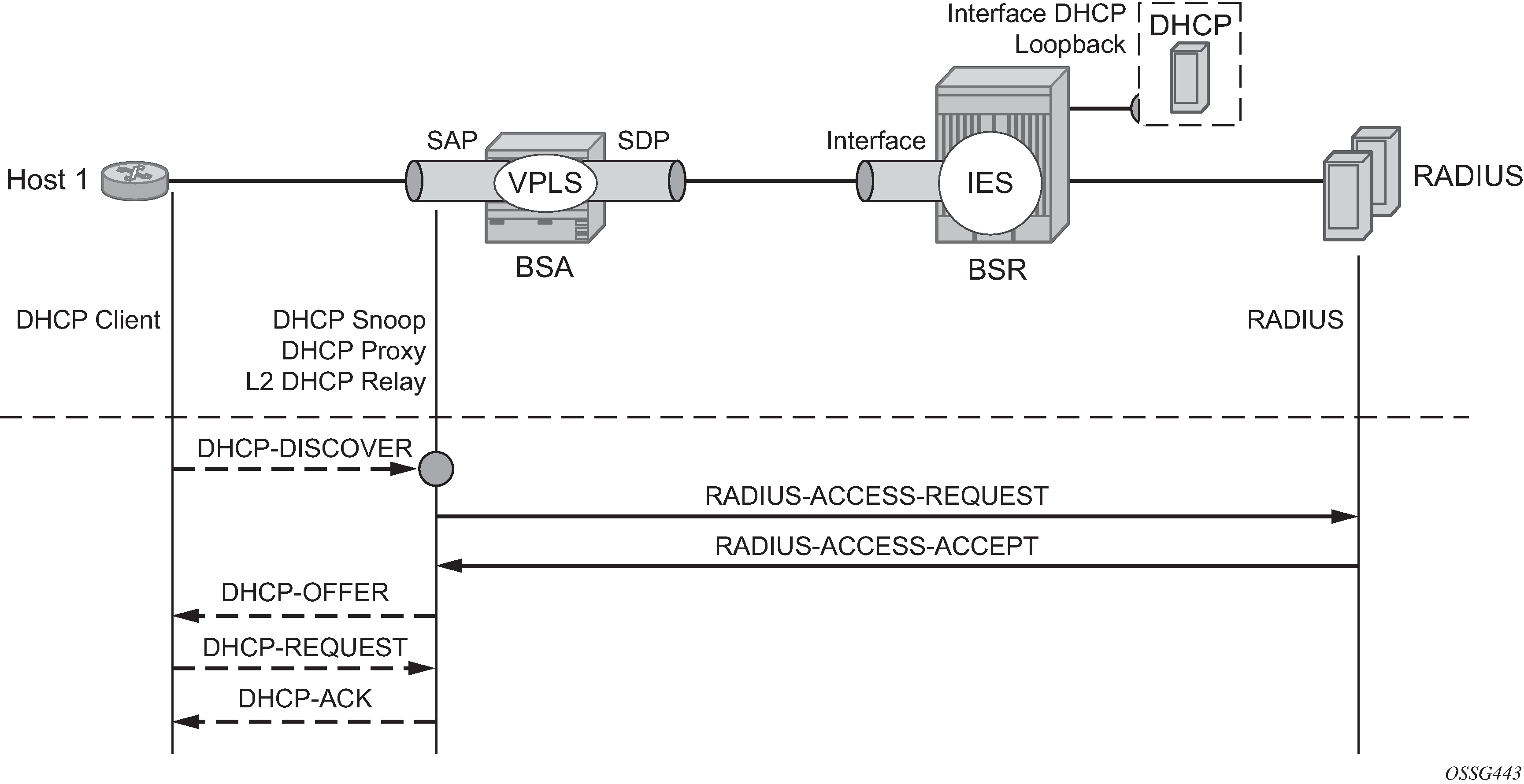
Host-1 sends DHCP discover message in VLAN 100 to BSA. BSA plays role of DHCP proxy server and transforms DHCP discover into RADIUS access-request message. After receiving RADIUS access-accept BSA transforms it to DHCP Ack message. Session setup process could be represented using debug commands:
A:BSA# debug service id 100 dhcp mode egr-ingr-and-dropped
A:BSA# debug service id 100 dhcp detail-level medium
A:BSA# debug radius detail
18 2009/12/15 06:31:56.63 UTC MINOR: DEBUG #2001 Base SVCMGR
"SVCMGR: RX DHCP Packet
VPLS 100, SAP 1/1/4:100
BootRequest to UDP port 67
ciaddr: 0.0.0.0 yiaddr: 0.0.0.0
siaddr: 0.0.0.0 giaddr: 0.0.0.0
chaddr: ca:00:0c:54:00:08 xid: 0xd42
DHCP options:
[53] Message type: Discover
---snip---
"
19 2009/12/15 06:31:56.63 UTC MINOR: DEBUG #2001 management RADIUS
"RADIUS: Access-Request
user ca:00:0c:54:00:08 policy auth-policy-1"
20 2009/12/15 06:31:56.63 UTC MINOR: DEBUG #2001 management RADIUS
"RADIUS: Transmit
Access-Request(1) 192.0.2.5:1812 id 69 len 85
USER NAME [1] 17 ca:00:0c:54:00:08
PASSWORD [2] 16 lkhSVrFePQ0A0Xc4ZyMwMk
NAS IP ADDRESS [4] 4 192.0.2.1
NAS PORT TYPE [61] 4 Ethernet(15)
NAS PORT ID [87] 9 1/1/4:100
NAS IDENTIFIER [32] 3 BSA
"
21 2009/12/15 06:31:56.73 UTC MINOR: DEBUG #2001 management RADIUS
"RADIUS: Receive
Access-Accept(2) id 69 len 108 from 138.203.18.79:1812
VSA [26] 10 Alcatel(6527)
SUBSC ID STR [11] 8 sub-id-1
VSA [26] 15 Alcatel(6527)
SUBSC PROF STR [12] 13 sub-profile-1
VSA [26] 15 Alcatel(6527)
SLA PROF STR [13] 13 sla-profile-1
FRAMED IP ADDRESS [8] 4 10.0.1.1
FRAMED IP NETMASK [9] 4 255.255.255.0
VSA [26] 6 Alcatel(6527)
DEFAULT ROUTER [18] 4 10.0.1.254
SESSION TIMEOUT [27] 4 6000
"
22 2009/12/15 06:31:56.73 UTC MINOR: DEBUG #2001 Base SVCMGR
"SVCMGR: TX DHCP Packet
VPLS 100, SAP 1/1/4:100
BootReply to UDP port 68
ciaddr: 0.0.0.0 yiaddr: 10.0.1.1
siaddr: 10.0.1.253 giaddr: 0.0.0.0
chaddr: ca:00:0c:54:00:08 xid: 0xd42
DHCP options:
[53] Message type: Offer
---snip---
"
23 2009/12/15 06:31:57.57 UTC MINOR: DEBUG #2001 Base SVCMGR
"SVCMGR: RX DHCP Packet
VPLS 100, SAP 1/1/4:100
BootRequest to UDP port 67
ciaddr: 0.0.0.0 yiaddr: 0.0.0.0
siaddr: 0.0.0.0 giaddr: 0.0.0.0
chaddr: ca:00:0c:54:00:08 xid: 0xd42
DHCP options:
[53] Message type: Request
---snip---
"
24 2009/12/15 06:31:57.57 UTC MINOR: DEBUG #2001 Base SVCMGR
"SVCMGR: TX DHCP Packet
VPLS 100, SAP 1/1/4:100
BootReply to UDP port 68
ciaddr: 0.0.0.0 yiaddr: 10.0.1.1
siaddr: 10.0.1.253 giaddr: 0.0.0.0
chaddr: ca:00:0c:54:00:08 xid: 0xd42
DHCP options:
[53] Message type: Ack
---snip---
The number of snooped/forwarded/dropped/proxied DHCP packets can be checked using the show service id 100 dhcp statistics command.
A:BSA# show service id 100 dhcp statistics
=====================================================
DHCP Statistics, service 100
=====================================================
Client Packets Snooped : 2
Client Packets Forwarded : 0
Client Packets Dropped : 0
Client Packets Proxied (RADIUS) : 2
Client Packets Proxied (Lease-Split) : 0
Server Packets Snooped : 0
Server Packets Forwarded : 0
Server Packets Dropped : 0
DHCP RELEASEs Spoofed : 0
DHCP FORCERENEWs Spoofed : 0
=====================================================
A:BSA#
Connectivity of Host-1could be checked with the show service id 100 subscriber-hosts command. Different options can be used to filter output of the command.
A:BSA# show service id 100 subscriber-hosts detail
===============================================================================
Subscriber Host table
===============================================================================
Sap IP Address MAC Address PPPoE-SID Origin
Subscriber
-------------------------------------------------------------------------------
1/1/4:100 10.0.1.1 ca:00:0c:54:00:08 N/A DHCP
sub-id-1
-------------------------------------------------------------------------------
Sub Profile : sub-profile-1
SLA Profile : sla-profile-1
App Profile : N/A
-------------------------------------------------------------------------------
Number of subscriber hosts : 1
The DHCP lease state can be checked with the show service id 100 dhcp lease-state command. Different options can be used to filter output of a command.
A:BSA# show service id 100 dhcp lease-state detail
===============================================================================
DHCP lease states for service 100
===============================================================================
Service ID : 100
IP Address : 10.0.1.1
Client HW Address : ca:00:0c:54:00:08
SAP : 1/1/4:100
Remaining Lifetime : 01h33m41s
Persistence Key : N/A
Sub-Ident : "sub-id-1"
Sub-Profile-String : "sub-profile-1"
SLA-Profile-String : "sla-profile-1"
---snip---
Sub-Ident origin : Radius
Strings origin : Radius
Lease Info origin : Radius
---snip---
Radius User-Name : "ca:00:0c:54:00:08"
-------------------------------------------------------------------------------
Number of lease states : 1
===============================================================================
A:BSA#
Host-2 Setup Debug
Host-1 setup process is displayed in Host-2 Setup Process.
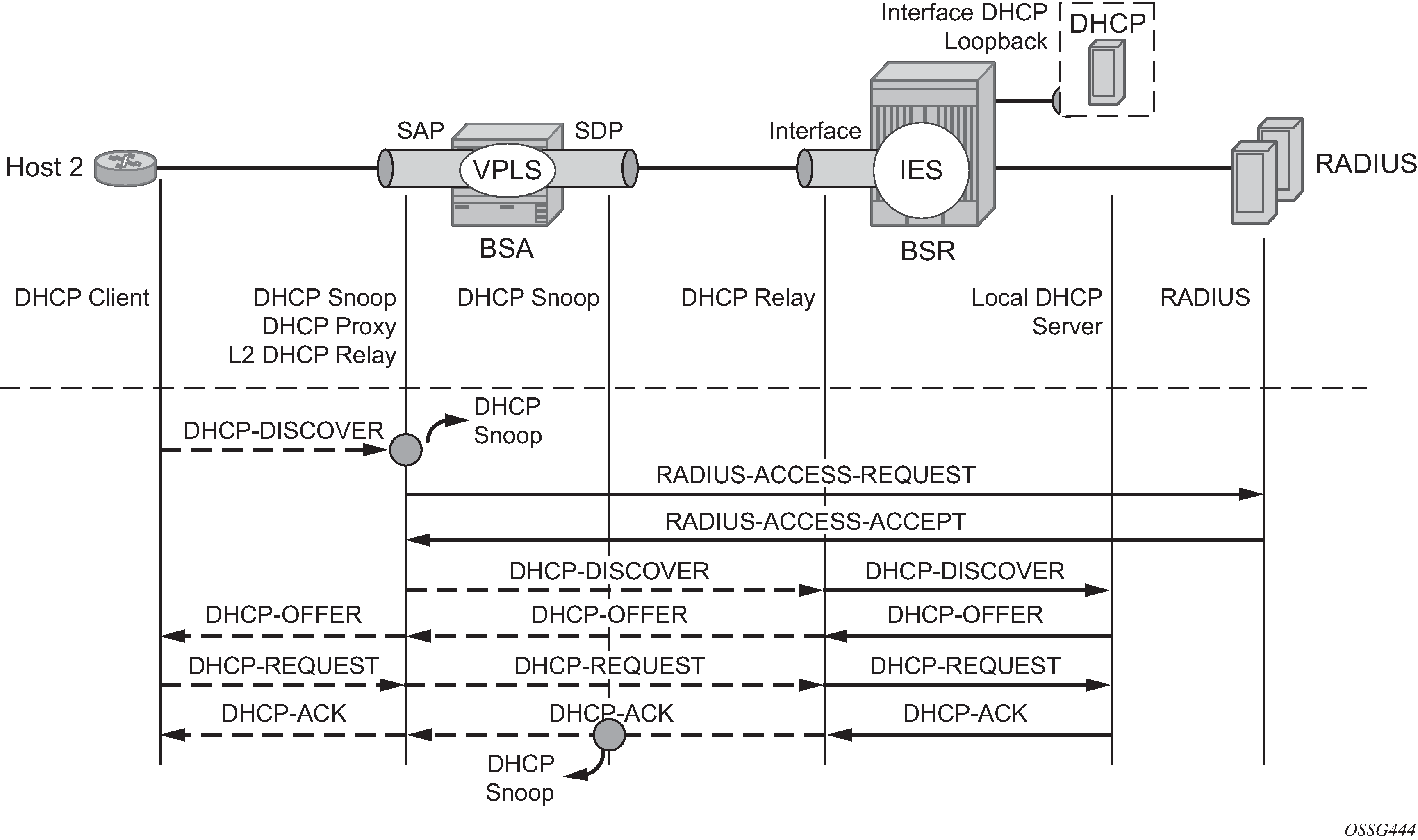
Host-2 sends DHCP discover message in VLAN 200 to BSA. Host-2 is authenticated through RADIUS and gets subscriber-id, sla/sub-profiles. DHCP Discover message is flooded in VPLS service and reaches IP interface on BSA, where DHCP relay is configured. Session setup process could be represented using debug commands:
A:BSA# debug service id 200 dhcp mode egr-ingr-and-dropped
A:BSA# debug service id 200 dhcp detail-level medium
A:BSA#
*A:BSA#
18 2009/12/15 13:00:36.28 UTC MINOR: DEBUG #2001 Base SVCMGR
"SVCMGR: RX DHCP Packet
VPLS 200, SAP 1/1/4:200
BootRequest to UDP port 67
ciaddr: 0.0.0.0 yiaddr: 0.0.0.0
siaddr: 0.0.0.0 giaddr: 0.0.0.0
chaddr: ca:01:08:10:00:08 xid: 0xfc8
DHCP options:
[53] Message type: Discover
---snip---
19 2009/12/15 13:00:36.28 UTC MINOR: DEBUG #2001 management RADIUS
"RADIUS: Access-Request
user ca:01:08:10:00:08 policy auth-policy-1"
20 2009/12/15 13:00:36.28 UTC MINOR: DEBUG #2001 management RADIUS
"RADIUS: Transmit
Access-Request(1) 192.0.2.5:1812 id 80 len 85
USER NAME [1] 17 ca:01:08:10:00:08
PASSWORD [2] 16 .czdppt/0qAsqKqStbvnV.
NAS IP ADDRESS [4] 4 192.0.2.1
NAS PORT TYPE [61] 4 Ethernet(15)
NAS PORT ID [87] 9 1/1/4:200
NAS IDENTIFIER [32] 3 BSA
"
21 2009/12/15 13:00:36.34 UTC MINOR: DEBUG #2001 management RADIUS
"RADIUS: Receive
Access-Accept(2) id 80 len 78 from 138.203.18.79:1812
VSA [26] 10 Alcatel(6527)
SUBSC ID STR [11] 8 sub-id-1
VSA [26] 15 Alcatel(6527)
SUBSC PROF STR [12] 13 sub-profile-1
VSA [26] 15 Alcatel(6527)
SLA PROF STR [13] 13 sla-profile-2
"
22 2009/12/15 13:00:36.34 UTC MINOR: DEBUG #2001 Base SVCMGR
"SVCMGR: TX DHCP Packet
flooding in VPLS 200
BootRequest to UDP port 67
ciaddr: 0.0.0.0 yiaddr: 0.0.0.0
siaddr: 0.0.0.0 giaddr: 0.0.0.0
chaddr: ca:01:08:10:00:08 xid: 0xfc8
DHCP options:
[53] Message type: Discover
---snip---
"
23 2009/12/15 13:00:36.35 UTC MINOR: DEBUG #2001 Base SVCMGR
"SVCMGR: RX DHCP Packet
VPLS 200, spoke-sdp 12:200
BootReply to UDP port 68
ciaddr: 0.0.0.0 yiaddr: 10.0.2.1
siaddr: 192.0.2.4 giaddr: 0.0.0.0
chaddr: ca:01:08:10:00:08 xid: 0xfc8
DHCP options:
[53] Message type: Offer
---snip---
"
24 2009/12/15 13:00:36.34 UTC MINOR: DEBUG #2001 Base SVCMGR
"SVCMGR: TX DHCP Packet
VPLS 200, SAP 1/1/4:200
BootReply to UDP port 68
ciaddr: 0.0.0.0 yiaddr: 10.0.2.1
siaddr: 192.0.2.4 giaddr: 0.0.0.0
chaddr: ca:01:08:10:00:08 xid: 0xfc8
DHCP options:
[53] Message type: Offer
---snip---
"
25 2009/12/15 13:00:36.46 UTC MINOR: DEBUG #2001 Base SVCMGR
"SVCMGR: RX DHCP Packet
VPLS 200, SAP 1/1/4:200
BootRequest to UDP port 67
ciaddr: 0.0.0.0 yiaddr: 0.0.0.0
siaddr: 0.0.0.0 giaddr: 0.0.0.0
chaddr: ca:01:08:10:00:08 xid: 0xfc8
DHCP options:
[53] Message type: Request
---snip---
"
26 2009/12/15 13:00:36.46 UTC MINOR: DEBUG #2001 Base SVCMGR
"SVCMGR: TX DHCP Packet
flooding in VPLS 200
BootRequest to UDP port 67
ciaddr: 0.0.0.0 yiaddr: 0.0.0.0
siaddr: 0.0.0.0 giaddr: 0.0.0.0
chaddr: ca:01:08:10:00:08 xid: 0xfc8
DHCP options:
[53] Message type: Request
---snip---
"
27 2009/12/15 13:00:36.47 UTC MINOR: DEBUG #2001 Base SVCMGR
"SVCMGR: RX DHCP Packet
VPLS 200, spoke-sdp 12:200
BootReply to UDP port 68
ciaddr: 0.0.0.0 yiaddr: 10.0.2.1
siaddr: 192.0.2.4 giaddr: 0.0.0.0
chaddr: ca:01:08:10:00:08 xid: 0xfc8
DHCP options:
[53] Message type: Ack
---snip---
"
28 2009/12/15 13:00:36.46 UTC MINOR: DEBUG #2001 Base SVCMGR
"SVCMGR: TX DHCP Packet
VPLS 200, SAP 1/1/4:200
BootReply to UDP port 68
ciaddr: 0.0.0.0 yiaddr: 10.0.2.1
siaddr: 192.0.2.4 giaddr: 0.0.0.0
chaddr: ca:01:08:10:00:08 xid: 0xfc8
DHCP options:
[53] Message type: Ack
---snip---
"
DHCP relay is enabled in service IES-200 on BSR.
A:BSR# debug router ip dhcp mode egr-ingr-and-dropped
A:BSR#
*A:BSR#
17 2009/12/15 13:00:36.34 UTC MINOR: DEBUG #2001 Base PIP
"PIP: DHCP
instance 1 (Base), interface index 6 (int-host-2),
received DHCP Boot Request on Interface int-host-2 (1/1/2) Port 67
H/W Type: Ethernet(10Mb) H/W Address Length: 6
ciaddr: 0.0.0.0 yiaddr: 0.0.0.0
siaddr: 0.0.0.0 giaddr: 0.0.0.0
chaddr: ca:01:08:10:00:08 xid: 0xfc8
DHCP options:
[53] Message type: Discover
---snip---
"
18 2009/12/15 13:00:36.34 UTC MINOR: DEBUG #2001 Base PIP
"PIP: DHCP
instance 1 (Base),
transmitted DHCP Boot Request to 192.0.2.4 Port 67
H/W Type: Ethernet(10Mb) H/W Address Length: 6
ciaddr: 0.0.0.0 yiaddr: 0.0.0.0
siaddr: 0.0.0.0 giaddr: 10.0.2.254
chaddr: ca:01:08:10:00:08 xid: 0xfc8
DHCP options:
[53] Message type: Discover
---snip---
"
19 2009/12/15 13:00:36.35 UTC MINOR: DEBUG #2001 Base PIP
"PIP: DHCP
instance 1 (Base),
received DHCP Boot Reply on 192.0.2.4 Port 67
H/W Type: Ethernet(10Mb) H/W Address Length: 6
ciaddr: 0.0.0.0 yiaddr: 10.0.2.1
siaddr: 192.0.2.4 giaddr: 10.0.2.254
chaddr: ca:01:08:10:00:08 xid: 0xfc8
DHCP options:
[53] Message type: Offer
---snip---
"
20 2009/12/15 13:00:36.35 UTC MINOR: DEBUG #2001 Base PIP
"PIP: DHCP
instance 1 (Base), interface index 6 (int-host-2),
transmitted DHCP Boot Reply to Interface int-host-2 (spoke-21:200) Port 68
H/W Type: Ethernet(10Mb) H/W Address Length: 6
ciaddr: 0.0.0.0 yiaddr: 10.0.2.1
siaddr: 192.0.2.4 giaddr: 0.0.0.0
chaddr: ca:01:08:10:00:08 xid: 0xfc8
DHCP options:
[53] Message type: Offer
---snip---
"
21 2009/12/15 13:00:36.47 UTC MINOR: DEBUG #2001 Base PIP
"PIP: DHCP
instance 1 (Base), interface index 6 (int-host-2),
received DHCP Boot Request on Interface int-host-2 (1/1/2) Port 67
H/W Type: Ethernet(10Mb) H/W Address Length: 6
ciaddr: 0.0.0.0 yiaddr: 0.0.0.0
siaddr: 0.0.0.0 giaddr: 0.0.0.0
chaddr: ca:01:08:10:00:08 xid: 0xfc8
DHCP options:
[53] Message type: Request
---snip---
"
22 2009/12/15 13:00:36.47 UTC MINOR: DEBUG #2001 Base PIP
"PIP: DHCP
instance 1 (Base),
transmitted DHCP Boot Request to 192.0.2.4 Port 67
H/W Type: Ethernet(10Mb) H/W Address Length: 6
ciaddr: 0.0.0.0 yiaddr: 0.0.0.0
siaddr: 0.0.0.0 giaddr: 10.0.2.254
chaddr: ca:01:08:10:00:08 xid: 0xfc8
DHCP options:
[53] Message type: Request
---snip---
"
23 2009/12/15 13:00:36.47 UTC MINOR: DEBUG #2001 Base PIP
"PIP: DHCP
instance 1 (Base),
received DHCP Boot Reply on 192.0.2.4 Port 67
H/W Type: Ethernet(10Mb) H/W Address Length: 6
ciaddr: 0.0.0.0 yiaddr: 10.0.2.1
siaddr: 192.0.2.4 giaddr: 10.0.2.254
chaddr: ca:01:08:10:00:08 xid: 0xfc8
DHCP options:
[53] Message type: Ack
---snip---
"
24 2009/12/15 13:00:36.47 UTC MINOR: DEBUG #2001 Base PIP
"PIP: DHCP
instance 1 (Base), interface index 6 (int-host-2),
transmitted DHCP Boot Reply to Interface int-host-2 (spoke-21:200) Port 68
H/W Type: Ethernet(10Mb) H/W Address Length: 6
ciaddr: 0.0.0.0 yiaddr: 10.0.2.1
siaddr: 192.0.2.4 giaddr: 0.0.0.0
chaddr: ca:01:08:10:00:08 xid: 0xfc8
DHCP options:
[53] Message type: Ack
---snip---
The number of snooped/forwarded/dropped/proxied DHCP packets could be checked using the show service id 200 dhcp statistics command.
A:BSA# show service id 200 dhcp statistics
=====================================================
DHCP Statistics, service 200
=====================================================
Client Packets Snooped : 2
Client Packets Forwarded : 2
Client Packets Dropped : 0
Client Packets Proxied (RADIUS) : 0
Client Packets Proxied (Lease-Split) : 0
Server Packets Snooped : 2
Server Packets Forwarded : 2
Server Packets Dropped : 0
DHCP RELEASEs Spoofed : 0
DHCP FORCERENEWs Spoofed : 0
=====================================================
A:BSA#
The connectivity of Host-2 can be verified with the show service id 200 subscriber-hosts command. Different options can be used to filter output of the command.
A:BSA# show service id 200 subscriber-hosts detail
===============================================================================
Subscriber Host table
===============================================================================
Sap IP Address MAC Address PPPoE-SID Origin
Subscriber
-------------------------------------------------------------------------------
1/1/4:200 10.0.2.1 ca:01:08:10:00:08 N/A DHCP
sub-id-1
-------------------------------------------------------------------------------
Sub Profile : sub-profile-1
SLA Profile : sla-profile-2
App Profile : N/A
-------------------------------------------------------------------------------
Number of subscriber hosts : 1
===============================================================================
A:BSA#
DHCP lease state can be verified with the show service id 200 dhcp lease-state command. Different options can be used to filter output of the command.
A:BSA# show service id 200 dhcp lease-state detail
===============================================================================
DHCP lease states for service 200
===============================================================================
Service ID : 200
IP Address : 10.0.2.1
Client HW Address : ca:01:08:10:00:08
SAP : 1/1/4:200
Remaining Lifetime : 09d23h44m
Persistence Key : N/A
Sub-Ident : "sub-id-1"
Sub-Profile-String : "sub-profile-1"
SLA-Profile-String : "sla-profile-2"
---snip---
Sub-Ident origin : Radius
Strings origin : Radius
Lease Info origin : DHCP
---snip---
Radius User-Name : "ca:01:08:10:00:08"
-------------------------------------------------------------------------------
Number of lease states : 1
===============================================================================
A:BSA#
Host-3 Setup Debug
The Host-3 setup process is presented in Host-3 Setup Process.
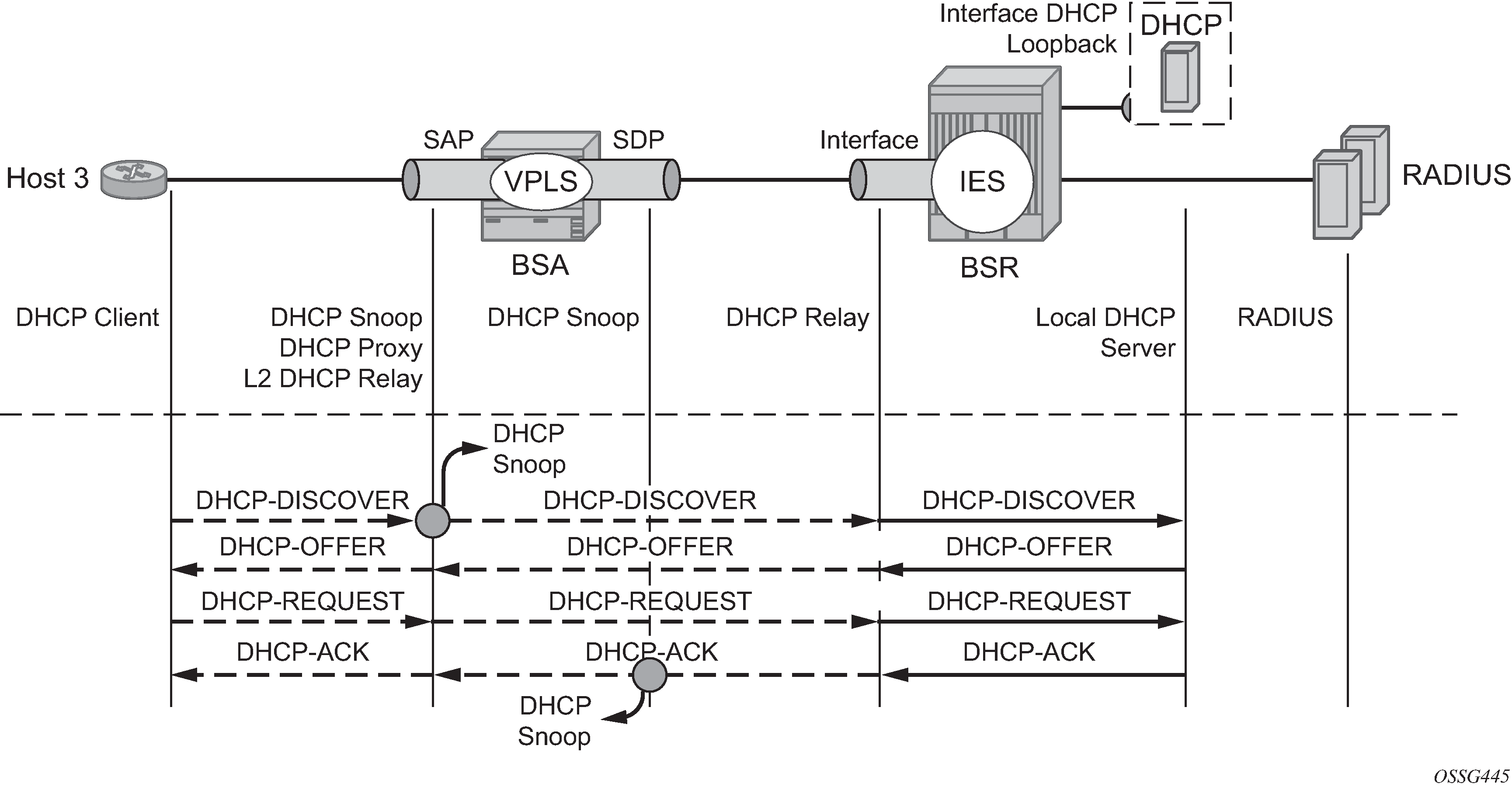
Host-3 sends DHCP a discover message in VLAN 300 to BSA. Host-3 receives all parameters from the DHCP server using pre-configured Option 254. A DHCP discover message is flooded in VPLS service and reaches IP interface on BSA where DHCP relay is configured. The session setup process can be represented using debug commands.
A:BSA# debug service id 300 dhcp mode egr-ingr-and-dropped
A:BSA# debug service id 300 dhcp detail-level medium
*A:BSA#
33 2009/12/15 13:02:34.39 UTC MINOR: DEBUG #2001 Base SVCMGR
"SVCMGR: RX DHCP Packet
VPLS 300, SAP 1/1/4:300
BootRequest to UDP port 67
ciaddr: 0.0.0.0 yiaddr: 0.0.0.0
siaddr: 0.0.0.0 giaddr: 0.0.0.0
chaddr: ca:02:02:d0:00:08 xid: 0x2a6
DHCP options:
[53] Message type: Discover
---snip---
"
34 2009/12/15 13:02:34.38 UTC MINOR: DEBUG #2001 Base SVCMGR
"SVCMGR: TX DHCP Packet
flooding in VPLS 300
BootRequest to UDP port 67
ciaddr: 0.0.0.0 yiaddr: 0.0.0.0
siaddr: 0.0.0.0 giaddr: 0.0.0.0
chaddr: ca:02:02:d0:00:08 xid: 0x2a6
DHCP options:
[53] Message type: Discover
---snip---
"
35 2009/12/15 13:02:34.40 UTC MINOR: DEBUG #2001 Base SVCMGR
"SVCMGR: RX DHCP Packet
VPLS 300, spoke-sdp 12:300
BootReply to UDP port 68
ciaddr: 0.0.0.0 yiaddr: 10.0.3.1
siaddr: 192.0.2.4 giaddr: 0.0.0.0
chaddr: ca:02:02:d0:00:08 xid: 0x2a6
DHCP options:
[53] Message type: Offer
---snip---
"
36 2009/12/15 13:02:34.40 UTC MINOR: DEBUG #2001 Base SVCMGR
"SVCMGR: TX DHCP Packet
VPLS 300, SAP 1/1/4:300
BootReply to UDP port 68
ciaddr: 0.0.0.0 yiaddr: 10.0.3.1
siaddr: 192.0.2.4 giaddr: 0.0.0.0
chaddr: ca:02:02:d0:00:08 xid: 0x2a6
DHCP options:
[53] Message type: Offer
---snip---
"
37 2009/12/15 13:02:34.52 UTC MINOR: DEBUG #2001 Base SVCMGR
"SVCMGR: RX DHCP Packet
VPLS 300, SAP 1/1/4:300
BootRequest to UDP port 67
ciaddr: 0.0.0.0 yiaddr: 0.0.0.0
siaddr: 0.0.0.0 giaddr: 0.0.0.0
chaddr: ca:02:02:d0:00:08 xid: 0x2a6
DHCP options:
[53] Message type: Request
---snip---
"
38 2009/12/15 13:02:34.52 UTC MINOR: DEBUG #2001 Base SVCMGR
"SVCMGR: TX DHCP Packet
flooding in VPLS 300
BootRequest to UDP port 67
ciaddr: 0.0.0.0 yiaddr: 0.0.0.0
siaddr: 0.0.0.0 giaddr: 0.0.0.0
chaddr: ca:02:02:d0:00:08 xid: 0x2a6
DHCP options:
[53] Message type: Request
---snip---
"
39 2009/12/15 13:02:34.53 UTC MINOR: DEBUG #2001 Base SVCMGR
"SVCMGR: RX DHCP Packet
VPLS 300, spoke-sdp 12:300
BootReply to UDP port 68
ciaddr: 0.0.0.0 yiaddr: 10.0.3.1
siaddr: 192.0.2.4 giaddr: 0.0.0.0
chaddr: ca:02:02:d0:00:08 xid: 0x2a6
DHCP options:
[53] Message type: Ack
---snip---
"
40 2009/12/15 13:02:34.53 UTC MINOR: DEBUG #2001 Base SVCMGR
"SVCMGR: TX DHCP Packet
VPLS 300, SAP 1/1/4:300
BootReply to UDP port 68
ciaddr: 0.0.0.0 yiaddr: 10.0.3.1
siaddr: 192.0.2.4 giaddr: 0.0.0.0
chaddr: ca:02:02:d0:00:08 xid: 0x2a6
DHCP options:
[53] Message type: Ack
---snip---
DHCP relay is enabled in service IES-300 on the BSR.
A:BSR# debug router ip dhcp mode egr-ingr-and-dropped
*A:BSR#
29 2009/12/15 13:02:34.39 UTC MINOR: DEBUG #2001 Base PIP
"PIP: DHCP
instance 1 (Base), interface index 7 (int-VoD),
received DHCP Boot Request on Interface int-VoD (1/1/2) Port 67
H/W Type: Ethernet(10Mb) H/W Address Length: 6
ciaddr: 0.0.0.0 yiaddr: 0.0.0.0
siaddr: 0.0.0.0 giaddr: 0.0.0.0
chaddr: ca:02:02:d0:00:08 xid: 0x2a6
DHCP options:
[53] Message type: Discover
---snip---
30 2009/12/15 13:02:34.39 UTC MINOR: DEBUG #2001 Base PIP
"PIP: DHCP
instance 1 (Base),
transmitted DHCP Boot Request to 192.0.2.4 Port 67
H/W Type: Ethernet(10Mb) H/W Address Length: 6
ciaddr: 0.0.0.0 yiaddr: 0.0.0.0
siaddr: 0.0.0.0 giaddr: 10.0.3.254
chaddr: ca:02:02:d0:00:08 xid: 0x2a6
DHCP options:
[53] Message type: Discover
---snip---
"
31 2009/12/15 13:02:34.39 UTC MINOR: DEBUG #2001 Base PIP
"PIP: DHCP
instance 1 (Base),
received DHCP Boot Reply on 192.0.2.4 Port 67
H/W Type: Ethernet(10Mb) H/W Address Length: 6
ciaddr: 0.0.0.0 yiaddr: 10.0.3.1
siaddr: 192.0.2.4 giaddr: 10.0.3.254
chaddr: ca:02:02:d0:00:08 xid: 0x2a6
DHCP options:
[53] Message type: Offer
---snip---
"
32 2009/12/15 13:02:34.39 UTC MINOR: DEBUG #2001 Base PIP
"PIP: DHCP
instance 1 (Base), interface index 7 (int-VoD),
transmitted DHCP Boot Reply to Interface int-VoD (spoke-21:300) Port 68
H/W Type: Ethernet(10Mb) H/W Address Length: 6
ciaddr: 0.0.0.0 yiaddr: 10.0.3.1
siaddr: 192.0.2.4 giaddr: 0.0.0.0
chaddr: ca:02:02:d0:00:08 xid: 0x2a6
DHCP options:
[53] Message type: Offer
---snip---
"
33 2009/12/15 13:02:34.53 UTC MINOR: DEBUG #2001 Base PIP
"PIP: DHCP
instance 1 (Base), interface index 7 (int-VoD),
received DHCP Boot Request on Interface int-VoD (1/1/2) Port 67
H/W Type: Ethernet(10Mb) H/W Address Length: 6
ciaddr: 0.0.0.0 yiaddr: 0.0.0.0
siaddr: 0.0.0.0 giaddr: 0.0.0.0
chaddr: ca:02:02:d0:00:08 xid: 0x2a6
DHCP options:
[53] Message type: Request
---snip---
"
34 2009/12/15 13:02:34.53 UTC MINOR: DEBUG #2001 Base PIP
"PIP: DHCP
instance 1 (Base),
transmitted DHCP Boot Request to 192.0.2.4 Port 67
H/W Type: Ethernet(10Mb) H/W Address Length: 6
ciaddr: 0.0.0.0 yiaddr: 0.0.0.0
siaddr: 0.0.0.0 giaddr: 10.0.3.254
chaddr: ca:02:02:d0:00:08 xid: 0x2a6
DHCP options:
[53] Message type: Request
---snip---
"
35 2009/12/15 13:02:34.53 UTC MINOR: DEBUG #2001 Base PIP
"PIP: DHCP
instance 1 (Base),
received DHCP Boot Reply on 192.0.2.4 Port 67
H/W Type: Ethernet(10Mb) H/W Address Length: 6
ciaddr: 0.0.0.0 yiaddr: 10.0.3.1
siaddr: 192.0.2.4 giaddr: 10.0.3.254
chaddr: ca:02:02:d0:00:08 xid: 0x2a6
DHCP options:
[53] Message type: Ack
---snip---
36 2009/12/15 13:02:34.53 UTC MINOR: DEBUG #2001 Base PIP
"PIP: DHCP
instance 1 (Base), interface index 7 (int-VoD),
transmitted DHCP Boot Reply to Interface int-VoD (spoke-21:300) Port 68
H/W Type: Ethernet(10Mb) H/W Address Length: 6
ciaddr: 0.0.0.0 yiaddr: 10.0.3.1
siaddr: 192.0.2.4 giaddr: 0.0.0.0
chaddr: ca:02:02:d0:00:08 xid: 0x2a6
DHCP options:
[53] Message type: Ack
---snip---
"
The number of snooped/forwarded/dropped/proxied DHCP packets can be verified with the using show service id 300 dhcp statistics command.
A:BSA# show service id 300 dhcp statistics
=====================================================
DHCP Statistics, service 300
=====================================================
Client Packets Snooped : 2
Client Packets Forwarded : 2
Client Packets Dropped : 0
Client Packets Proxied (RADIUS) : 0
Client Packets Proxied (Lease-Split) : 0
Server Packets Snooped : 2
Server Packets Forwarded : 2
Server Packets Dropped : 0
DHCP RELEASEs Spoofed : 0
DHCP FORCERENEWs Spoofed : 0
=====================================================
A:BSA#
The connectivity of Host-3 can be verified with the show service id 300 subscriber-hosts command. Different options can be used to filter output of a command.
A:BSA# show service id 300 subscriber-hosts detail
===============================================================================
Subscriber Host table
===============================================================================
Sap IP Address MAC Address PPPoE-SID Origin
Subscriber
-------------------------------------------------------------------------------
1/1/4:300 10.0.3.1 ca:02:02:d0:00:08 N/A DHCP
sub-id-1
-------------------------------------------------------------------------------
Sub Profile : sub-profile-1
SLA Profile : sla-profile-3
App Profile : N/A
-------------------------------------------------------------------------------
Number of subscriber hosts : 1
===============================================================================
A:BSA#
The DHCP lease state could be checked with the show service id 300 dhcp lease-state command. Different options can be used to filter output of a command.
A:BSA# show service id 300 dhcp lease-state detail
===============================================================================
DHCP lease states for service 300
===============================================================================
Service ID : 300
IP Address : 10.0.3.1
Client HW Address : ca:02:02:d0:00:08
SAP : 1/1/4:300
Remaining Lifetime : 09d23h52m
Persistence Key : N/A
Sub-Ident : "sub-id-1"
Sub-Profile-String : "sub-profile-1"
SLA-Profile-String : "sla-profile-3"
---snip---
Sub-Ident origin : DHCP
Strings origin : DHCP
Lease Info origin : DHCP
---snip---
Radius User-Name : ""
-------------------------------------------------------------------------------
Number of lease states : 1
===============================================================================
A:BSA#
Advanced Topics
Limiting Number of Subscribers
This topic is discussed in DHCP hosts. Refer to IPv4 DHCP Hosts for detailed information.
vpls 100 customer 1 create
---snip---
sap 1/1/4:100 split-horizon-group "RSHG-1" create
---snip---
sub-sla-mgmt
---snip---
multi-sub-sap 2
Limiting Number of Lease States
This topic is discussed in DHCP hosts. Refer to IPv4 DHCP Hosts for detailed information.
vpls 100 customer 1 create
---snip---
sap 1/1/4:100 split-horizon-group "RSHG-1" create
dhcp
lease-populate 400
Limiting Number of Host Per SLA-Profile
This topic is discussed in DHCP hosts. Refer to IPv4 DHCP Hosts for detailed information.
subscriber-mgmt
sla-profile "sla-profile-1" create
host-limit 1 [remove-oldest]
Subscriber Host Connectivity Verification
This topic is discussed in DHCP hosts. Refer to IPv4 DHCP Hosts for detailed information.
vpls 100 customer 1 create
sap 1/1/4:100 split-horizon-group "RSHG-1" create
host-connectivity-verify source-ip 10.1.0.253 source-mac 1e:54:ff:00:00:00 interval 1 action remove
A:BSA# show service id 100 host-connectivity-verify statistics
===============================================================================
Host connectivity check statistics
===============================================================================
Svc SapId/ DestIp Timestamp Time since Oper
Id SdpId Address last-reply/conn-lost Reply/Lost State
-------------------------------------------------------------------------------
100 1/1/4:100 10.0.1.1 12/15/2009 09:04:06 0d 00:00:11 Up
-------------------------------------------------------------------------------
1 host-connectivity states : 1 Up / 0 Down / 0 Retry pending
===============================================================================
A:BSA#
Lease Split
This topic is discussed in DHCP hosts. Refer to IPv4 DHCP Hosts for detailed information.
vpls 100 customer 1 create
---snip---
sap 1/1/4:100 split-horizon-group "RSHG-1" create
dhcp
proxy-server
lease-time hrs 1
DHCP Option 82
This topic is discussed in DHCP hosts. Refer to IPv4 DHCP Hosts for detailed information.
Conclusion
This note provides configuration and troubleshooting commands for Bridged CO model.